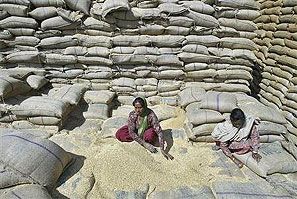Experts say the Bill should include higher-value food items than just cereals
Even as the government is gearing up to bring in the cereal-centric National Food Security Bill (NFSB), Indian households are fast changing their consumption preferences from cereals to higher value food items.  The share of monthly expenditure on cereals by families in total consumption spending has fallen drastically, prompting economists to suggest food security should have a larger basket than just cereals and should be reviewed periodically .
The share of monthly expenditure on cereals by families in total consumption spending has fallen drastically, prompting economists to suggest food security should have a larger basket than just cereals and should be reviewed periodically .
Rural households spent 12 per cent of their total consumption outlay on food in 2011-12 against 18 per cent in 2004-05, while the share fell to 7.3 per cent from 10.1 per cent in urban parts over the period.
The expenditure on pulses as a percentage share in total expenditure has remained constant in both urban and rural areas at 3.1 per cent and 2.1 per cent, respectively. Talking of milk products, it has risen to 9.1 per cent in 2011-12 from 8.5 per cent in 2004-05 in rural areas and has remained more or less the same in urban centres where it has declined marginally by 0.1 percentage points to 7.8 per cent in 2011-12.
When it comes to egg, fish and meat, the percentage share has increased in both rural and urban sectors. In the rural population, it rose to 3.6 per cent in 2011-12 from 3.3 per cent in 2004-05 and in urban, the share grew marginally to 2.8 per cent from 2.7 per cent in the same period.
While most economists said this is a sign of prosperity in the economy, some of them maintained that this could come as a blow to the highly-debated NFSB.
“Complexion of system is changing. There is a gradual change towards higher value agriculture food items. We must recognise that and our food policy should be in tune with this emerging demand pattern,” Ashok Gulati, chairman of the Commission for Agricultural Costs and Prices (CACP) told Business Standard.
He said the government is going ahead with cereal-centric distribution. “I had suggested to move to higher values as well or conditional transformation at least in the cities or give wider choice by identifying the basket of goods that they seek to buy,” said Gulati.
This transformation in consumption pattern, experts believed, happens when the economy is on a growth trajectory.
“Easy availability and relative price decline has led to this change and has made it easier for people, even in the poorest sections, to substitute. They now go for higher value food, which gives more protein and nourishment as cereals are calorie-based. Vegetables, food, milk products give other nutrients which are not available in cereals,” said S R Hashim, former member of the Planning Commission.
According to Hashim, NFSB can only include the basic necessities. “The Bill has to be cereal-centric as those are still the basic items. What we are looking at is just the average (of consumption expenditure). But within that group, there still is high number of households, which might be suffering to even procure cereals.”
He added that the policies need to be reviewed periodically. “These equations have to be revisited every five years. Even the poverty line should be reviewed from time to time. The basket of poverty line cannot be the same. The whole consumption keeps on changing with time,” said Hashim, under whose chairmanship a panel was appointed to evolve a uniform mechanism for identifying below poverty line a few years back.
The Bill - it has undergone numerous changes ever since it was first tabled in Parliament on December 2011 - will provide five kg of either wheat or rice or coarse cereals per person per month at Rs 3 per kg for rice, Rs 2 a kg for wheat and Rs 1 a kg for coarse cereals.
“The NFSB should recognise the changing consumption expenditure pattern and offer the people a wider choice, which will be in line with the production pattern. If you remain cereal, centric, you are moving in a regressive manner,” said Gulati.
The Bill seeks to provide food security to around 68 per cent of the population. However, economists are not convinced.
“This surely would be a huge burden on the government initially to cater to such large numbers, but what would matter is the implementation,” said D K Joshi, chief economist with Crisil.












 © 2025
© 2025